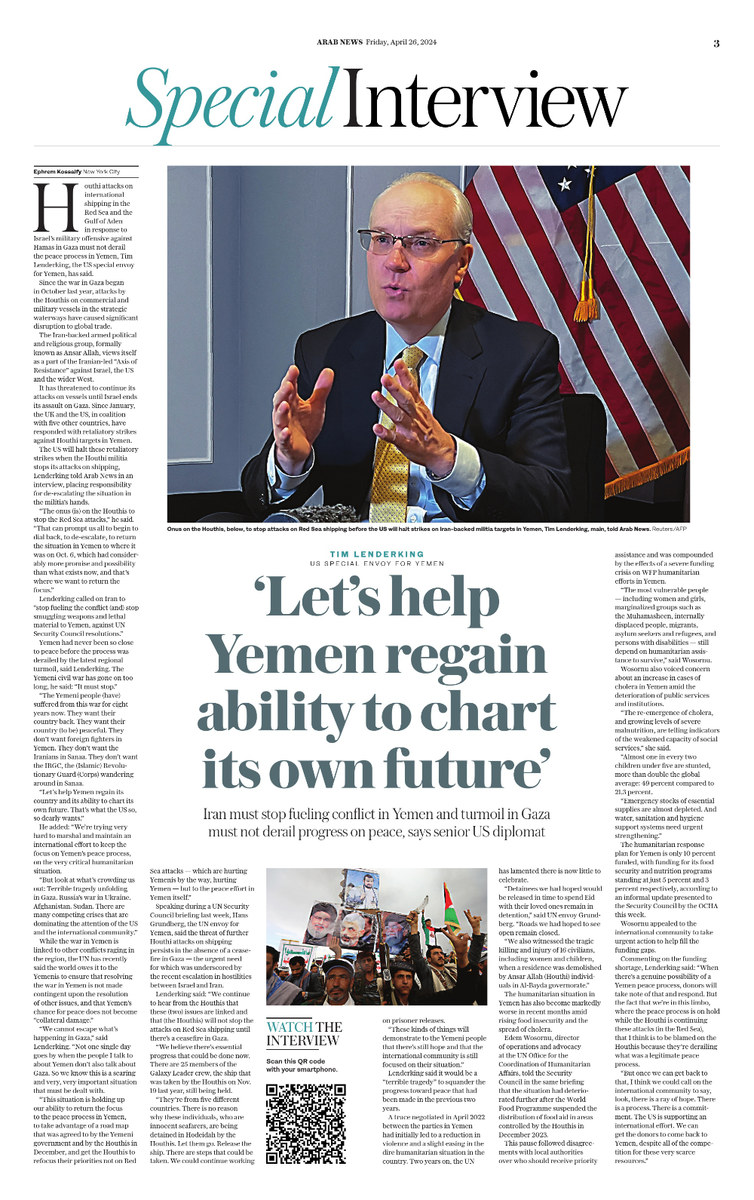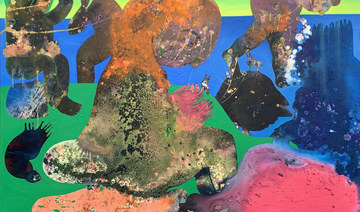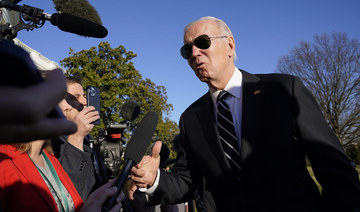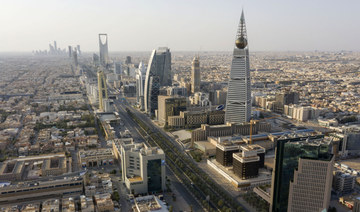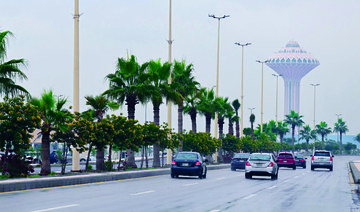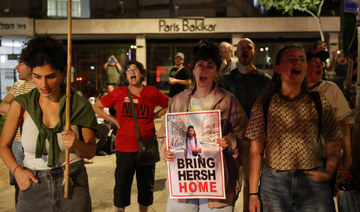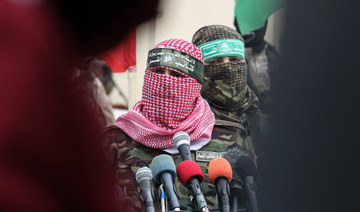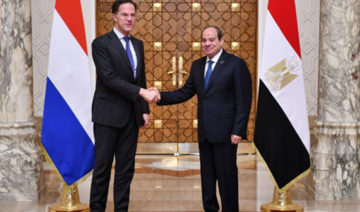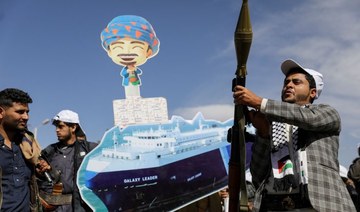Chibayish: Black buffaloes wade through the waters of Iraq’s Mesopotamian marshes, leisurely chewing on reeds. After years of drought, winter rains have brought some respite to herders and livestock in the famous wetlands.
Listed as a UNESCO World Heritage Site, the marshes were parched and dusty last summer by drought in the climate-stressed country and by reduced flow from the Tigris and Euphrates rivers due to dams built upstream in Turkiye and Iran.
Winter brings seasonal rains, offering relief in marshes like those of Huwaizah — which straddles the border with Iran — and Chibayish, located in nearby Dhi Qar province.
Among the reeds of Chibayish, buffalo farmer Rahim Daoud now uses a stick to punt his boat across an expanse of water.
“This summer, it was dirt here; there was no water,” said the 58-year-old. “With the rain that has fallen, the water level has risen.”
Last summer, photographers traveled to the Huwaizah and Chibayish marshes to document the disappearance of large portions of the wetlands, observing vast expanses of dry and cracked soil dotted with yellowed shrubs.
In October, an official in the impoverished rural province of Dhi Qar said that in the previous six months, 1,200 families had left the marshes and other agricultural areas of southern Iraq and more than 2,000 buffaloes had died.
Iraq has faced three consecutive years of severe drought and scorching heat, with temperatures regularly exceeding 50 degrees Celsius during the summer of 2022.
“There is a gradual improvement,” Hussein Al-Kenani said after the recent rains.
Kenani, who heads the governmental center in charge of protecting the wetlands, said rainwater collected in canals and rivers has been redirected to the marshes.
“The water level in Chibayish’s swamps has increased by more than 50 centimeters compared with December and by more than 30 centimeters for the Huwaizah swamps,” Kenani said.
In July, the UN Food and Agriculture Organization deplored the “unprecedented low water levels” in the marshes, highlighting “the disastrous impact” for more than 6,000 families, whose buffaloes and livelihoods were being lost.
The relief of rainfall early this month was welcomed by the UN agency, which noted in a statement that in the Chibayish region “salinity levels decreased” to the point where people and animals could again drink the water.
“This has had a great positive impact, especially on buffalo herders,” it said.
While the crisis has been relieved for now, there are fears about the longer-term fate of the threatened wetland habitat.
“There is not enough water coming from the Turkish side,” said Jassim Assadi, head of environmental group Nature Iraq, who added that Iraq’s dams upstream from the marshes “do not have an adequate and sufficient reservoir for the rest of the year.”
“The rains alone are not enough,” he said, voicing fears about another looming “problem next summer.”
After drought, winter rains revive Iraq’s famed marshlands
https://arab.news/5jmja
After drought, winter rains revive Iraq’s famed marshlands
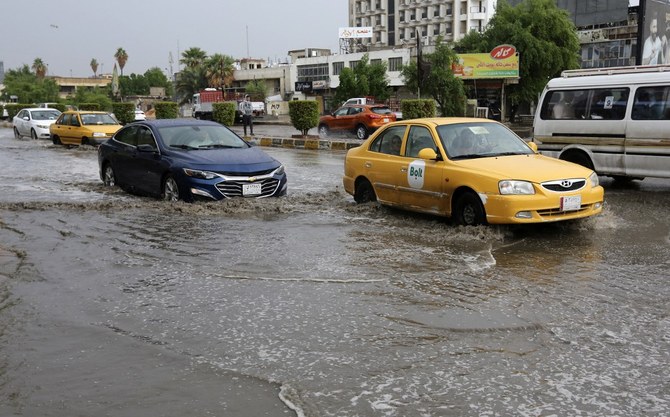
- raq has faced three consecutive years of severe drought and scorching heat, with temperatures regularly exceeding 50 degrees Celsius
Sheikh Mansour bin Zayed receives Saudi envoy in Abu Dhabi
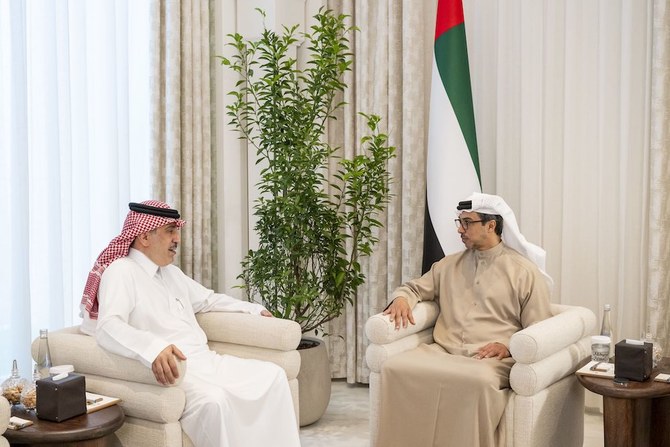
DUBAI: Sheikh Mansour bin Zayed Al-Nahyan, Vice President, Deputy Prime Minister and Chairman of the Presidential Court, has received Sultan bin Abdullah Al-Anqari, Saudi Arabia’s ambassador to the UAE.
During a meeting at Qasr Al-Shati in Abu Dhabi, the two officials discussed relations between the two countries and ways to enhance cooperation that would be beneficial to both nations, state news agency WAM said
Sheikh Mansour emphasized the robust ties between the UAE and Saudi Arabia are underpinned by the leadership of both countries.
US military starts pier construction off Gaza

- But humanitarian aid coming off the pier will need to pass through Israeli checkpoints on land
- Despite the aid having already been inspected by Israel in Cyprus prior to being shipped to Gaza
WASHINGTON: US troops have begun construction of a maritime pier off the coast of Gaza that aims to speed the flow of humanitarian aid into the enclave when it becomes operational in May, the Pentagon said on Thursday.
President Joe Biden announced the pier in March as aid officials implored Israel to ease access for relief supplies into Gaza over land routes. Whether the pier will ultimately succeed in boosting humanitarian aid is unclear, as international officials warn of the risk of famine in northern Gaza.
Israel’s six-month-long military campaign against Hamas has devastated the tiny Gaza Strip and plunged its 2.3 million people into a humanitarian catastrophe.
A senior Biden administration official, speaking to reporters on condition of anonymity, said humanitarian aid coming off the pier will need to pass through Israeli checkpoints on land. That is despite the aid having already been inspected by Israel in Cyprus prior to being shipped to Gaza. Israel wants to prevent any aid getting to Hamas fighters that boosts their war effort.

The prospect of checkpoints raises questions about possible delays even after aid reaches shore. The United Nations has long complained of obstacles to getting aid in and distributing it throughout Gaza.
“I can confirm that US military vessels, to include the USNS Benavidez, have begun to construct the initial stages of the temporary pier and causeway at sea,” Pentagon spokesperson Major General Patrick Ryder told reporters.
Concerns about the risk to American troops getting caught up in the Israel-Hamas war were underscored on Thursday as news emerged of a mortar attack near the area where the pier will eventually touch ground. No US forces were present, however, and Biden has ordered US forces to not step foot on the Gaza shore.
The pier will initially handle 90 trucks a day, but that number could go up to 150 trucks daily when it is fully operational. The United Nations said this week that the daily average number of trucks entering Gaza during April was 200 and that there had been a peak on Monday of 316.
The official added that about 1,000 US troops would support the military effort, including in coordination cells in Cyprus and Israel.
A third party will be driving trucks down the pier onto the beach, the official added.
The northern Gaza Strip is still heading toward a famine, the deputy UN food chief said on Thursday, appealing for a greater volume of aid and for Israel to allow direct access from its southern Ashdod port to the Erez crossing.
In a statement, the Israeli military said it would provide security and logistics support for the pier.
An Israeli military brigade, which includes thousands of soldiers, along with Israeli Navy ships and Air Force would work to protect US troops who are setting up the pier.
Ryder said the Pentagon was tracking some type of mortar attack in Gaza that caused minimal damage in the marshalling area for the pier. But he added that US forces had not started moving anything to that area yet and there were no US forces on the ground.
Hamas official says Israel ‘will not achieve’ goals in Rafah
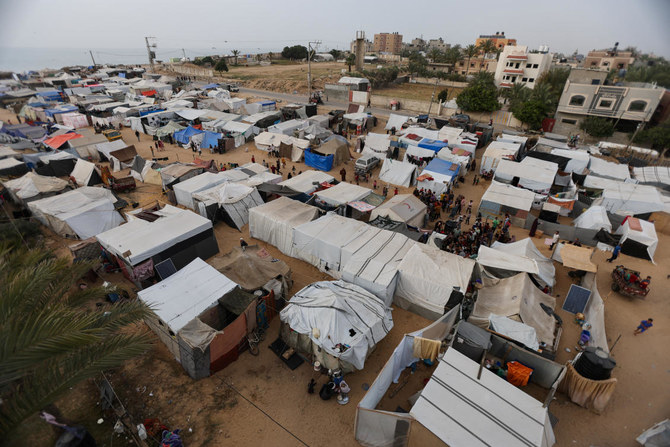
- “Even if (Israel) enters and invades Rafah, it will not achieve what it wants,” Ghazi Hamad said
- “This will undoubtedly threaten the negotiations because it is clear from this declared position that Israel is interested in continuing the war“
GAZA STRIP, Palestinian Territories: A senior Hamas official told AFP on Thursday that Israel would fail to meet its stated goals of defeating the Palestinian militant group and freeing hostages by invading the southern Gaza city Rafah.
“Even if (Israel) enters and invades Rafah, it will not achieve what it wants,” Ghazi Hamad said in an interview over the phone from Qatar, where a number of senior figures from Hamas’s political bureau are based.
Hamad said Israel had “spent nearly seven months in Gaza and invaded all areas and destroyed a lot, but so far has not been able to achieve anything of its main goals, whether eliminating Hamas or returning the captives.”
Israel has vowed to move on with the planned military operation in Rafah, despite international outcry and concern for about 1.5 million Palestinians sheltering in the city.
There are fears of huge civilian casualties and countries including Israel’s top ally and weapons supplier the United States have warned Israel against sending troops into Rafah.
“We have spoken with all parties involved in the conflict... about the seriousness of invading Rafah and that Israel is heading toward committing additional massacres and additional genocide,” Hamad said.
“This will undoubtedly threaten the negotiations because it is clear from this declared position that Israel is interested in continuing the war and aggression and has no intention of continuing negotiations and reaching an agreement,” he said.
Qatar, the United States and Egypt, have been mediating talks to secure a truce and the release of hostages, but those have stalled for days.
An Egyptian delegation is however set to travel to Israel on Friday to kickstart a new round of talks, Israeli media reported citing unnamed officials.
Israeli government spokesman David Mencer said Israel’s war cabinet was meeting Thursday “to discuss how to destroy the last battalions of Hamas.”
On Wednesday, Mencer said that since Israel began its ground invasion of Gaza on October 27, the army has destroyed “at least 18 or 19 of Hamas’s 24 battalions.”
Officials say the remaining battalions are in Rafah — the main target of the impending assault.
Most Gazans taking refuge in Rafah are sheltering in makeshift camps, and even before the start of the expected ground invasion, the city near the Egyptian border has been suffering regular Israeli bombings.
Hamad argued the planned invasion was exposing contradictions in Israeli Prime Minister Benjamin Netanyahu’s stance on Gaza.
“Netanyahu is stumbling because, on the one hand, he wants to return the captives to their families, as he says, but at the same time, he puts them in great danger, as his army deliberately killed many hostages.”
Israel’s army has admitted to mistakenly killing some hostages in Gaza.
Hamad accused Netanyahu of “manipulating and procrastinating” in a bid to “deceive the Israeli public that there are negotiations and deceive the international community as well that there are negotiations.”
He said the Israeli prime minister was “trying to twist the truth” and claim that “Hamas is the obstacle in these negotiations.”
Hamad said Qatar and Egypt were “making great efforts to reach an agreement,” but argued “the Israeli side unfortunately deals with the matter foolishly and is very confused.”
Hamad also told AFP that Hamas, which took power in Gaza in 2007, was already working on plans for the territory after the war.
He said the group was “working on the post-war phase to ensure that there is a great effort to rebuild the Gaza Strip and provide the necessities for a decent life.”
Palestinian militants took around 250 hostages to Gaza during Hamas’s October 7 attack that triggered the war.
Israeli officials say 129 hostages are still held in Gaza, including 34 the military says are dead.
The attack on southern Israel resulted in the deaths of 1,170 people, Israelis and foreigners, according to an AFP tally based on official Israeli figures.
Israel’s retaliatory offensive against Hamas in Gaza has killed 34,305 people, most of them women and children, according to the territory’s health ministry.
Shawarma restaurant in Cairo brings taste of home for displaced Palestinians
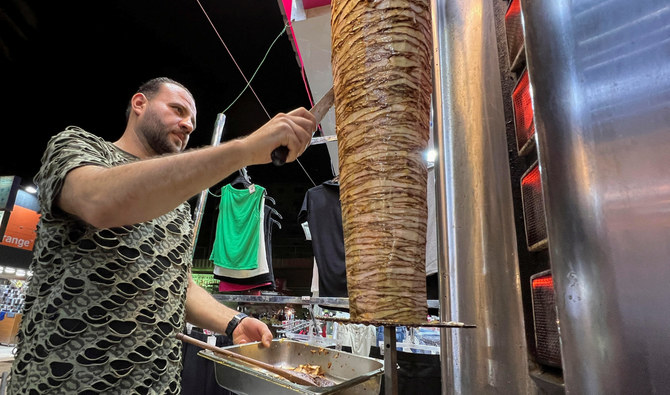
CAIRO: A Palestinian businessman displaced by the war in Gaza is bringing a taste of home for fellow refugees with a shawarma restaurant he has opened in Cairo.
“The Restaurant of Rimal Neighborhood” offers shawarma, a Middle Eastern dish of thinly sliced meat, and other Palestinian and Arab dishes.
“The name comes to eternalize Rimal, my neighborhood, and my homeland too,” said Basem Abu Al-Awn.
“It is also to replace the restaurant I once had in Gaza. Two restaurants of mine, in addition to my house and the houses of my relatives, were destroyed,” he said.
Abu Al-Awn hopes his time outside Gaza will be temporary, and he is determined to return to the enclave once the war between Israel and Hamas is over.
“I will return, even if I have to set up a tent near the rubble of my house. We are going back to Gaza, and we will rebuild it,” he said.
Rimal was Gaza City’s busiest shopping center, with large malls and main bank offices before Israeli forces reduced most of it to rubble.
It was also home to Gaza’s most famous shawarma places.
“The taste is the same. People tell us it tastes as if they are eating it in Gaza,” said Ahmed Awad, the new restaurant’s manager.
“The Egyptians who get to try our place keep coming back. They tell us the taste is nice and is different from the shawarma they usually get,” Awad said.
Gaza shawarma spices are unique and scarce in Cairo, so credit goes to Awad’s father, who mixes those available to give the dish a special Palestinian taste.
Many thousands of Palestinians have arrived in Gaza since the war began last October.
Awad, his wife, and four children arrived in Cairo three months ago.
In Gaza, he used to work in restaurants specializing in oriental and Western dishes.
With an end to the war looking like a distant prospect, Awad urged Palestinians not to give up.
“I advise them to work and take care of their lives. Their houses and everything may have gone, but no problem; it will come back again,” he said.
“Once things are resolved, we will return home, work there, and rebuild our country.”
Palestinians now stranded in Cairo include businessmen, students, and ordinary families who say they seek temporary legal residency to pursue investment and study plans until a ceasefire is in place.
Om Moaz, from Rafah in the southern Gaza Strip, had been struggling to pay for a rented house and treatment for her husband and daughter in Cairo. She began working from home, offering Palestinian food through social media.
She found there was a strong demand from both Egyptians and Palestinians.
“Some were in the war and came to Egypt. So they started ordering my food. And thank God, it’s a successful business, and hopefully, it continues,” she said.
‘Let’s help Yemen regain ability to chart its own future,’ US envoy Tim Lenderking tells Arab News
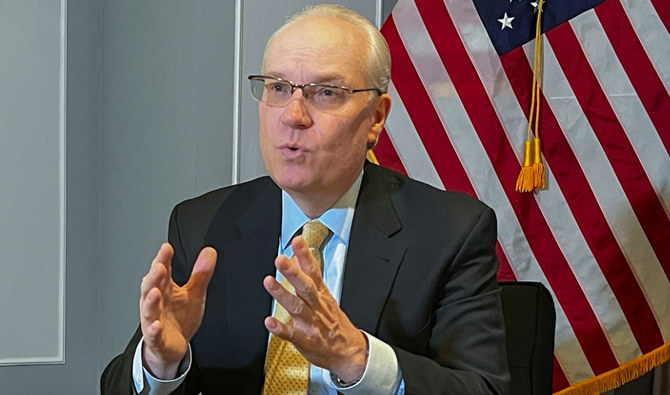
- Lenderking says it would be a ‘terrible tragedy’ to squander progress in Yemen peace process amid ‘competing crises’
- US envoy calls on Iran to stop fueling the conflict in Yemen and halt smuggling weapons to the Houthi militia
NEW YORK CITY: Houthi attacks on international shipping in the Red Sea and the Gulf of Aden in response to Israel’s military offensive against Hamas in Gaza must not derail the peace process in Yemen, Tim Lenderking, the US special envoy for Yemen, has said.
Since the war in Gaza began in October last year, attacks by the Houthis on commercial and military vessels in the strategic waterways have caused significant disruption to global trade.
The Iran-backed armed political and religious group, formally known as Ansar Allah, views itself as a part of the Iranian-led “Axis of Resistance” against Israel, the US and the wider West.
It has threatened to continue its attacks on vessels until Israel ends its assault on Gaza. Since January, the UK and the US, in coalition with five other countries, have responded with retaliatory strikes against Houthi targets in Yemen.
The US will halt these retaliatory strikes when the Houthi militia stops its attacks on shipping, Lenderking told Arab News in an interview, placing responsibility for de-escalating the situation in the militia’s hands.
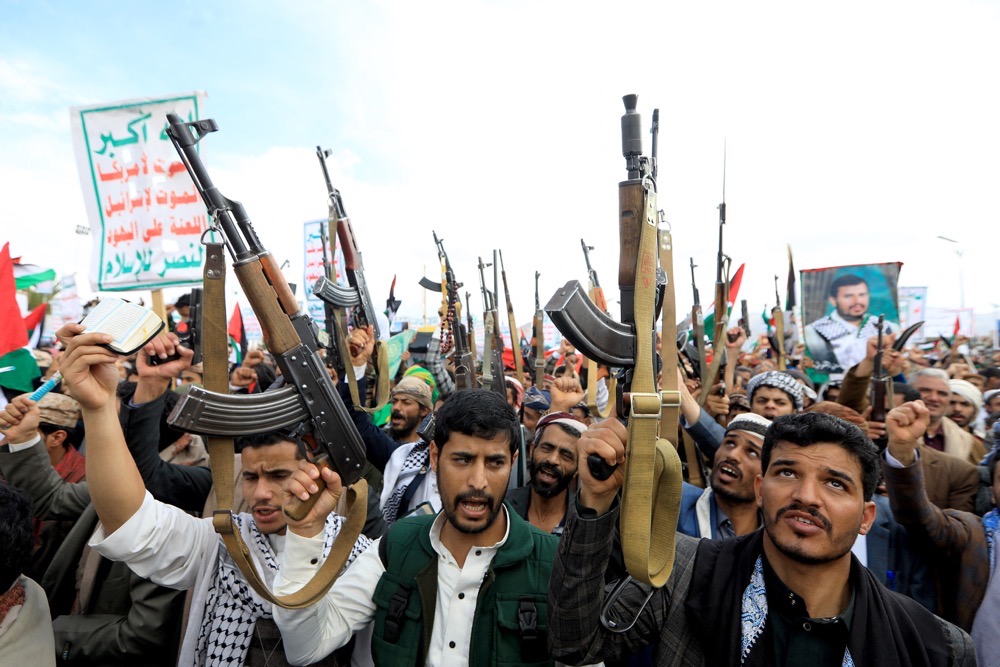
“The onus (is) on the Houthis to stop the Red Sea attacks,” he said. “That can prompt us all to begin to dial back, to de-escalate, to return the situation in Yemen to where it was on Oct. 6, which had considerably more promise and possibility than what exists now, and that’s where we want to return the focus.”
Lenderking called on Iran to “stop fueling the conflict (and) stop smuggling weapons and lethal material to Yemen, against UN Security Council resolutions.”
Yemen had never been so close to peace before the process was derailed by the latest regional turmoil, said Lenderking. The Yemeni civil war has gone on too long, he said: “It must stop.”
“The Yemeni people (have) suffered from this war for eight years now. They want their country back. They want their country (to be) peaceful. They don’t want foreign fighters in Yemen. They don’t want the Iranians in Sanaa. They don’t want the IRGC, the (Islamic) Revolutionary Guard (Corps) wandering around in Sanaa.
“Let’s help Yemen regain its country and its ability to chart its own future. That’s what the US so, so dearly wants.”
He added: “We’re trying very hard to marshal and maintain an international effort to keep the focus on Yemen’s peace process, on the very critical humanitarian situation.
“But look at what’s crowding us out: Terrible tragedy unfolding in Gaza. Russia’s war in Ukraine. Afghanistan. Sudan. There are many competing crises that are dominating the attention of the US and the international community.”
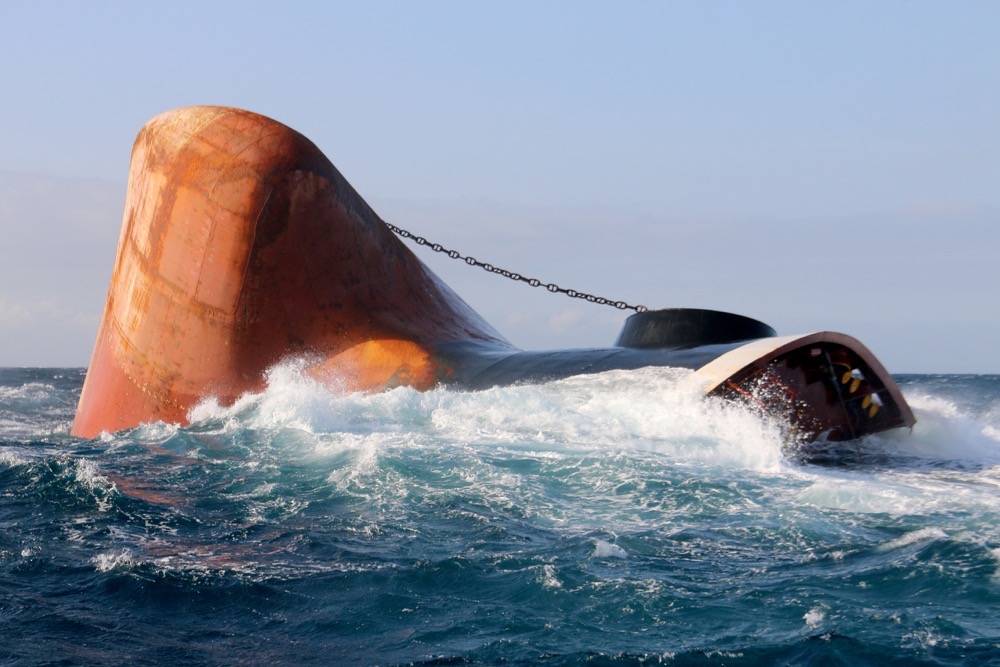
While the war in Yemen is linked to other conflicts raging in the region, the UN has recently said the world owes it to the Yemenis to ensure that resolving the war in Yemen is not made contingent upon the resolution of other issues, and that Yemen’s chance for peace does not become “collateral damage.”
“We cannot escape what’s happening in Gaza,” said Lenderking. “Not one single day goes by when the people I talk to about Yemen don’t also talk about Gaza. So we know this is a searing and very, very important situation that must be dealt with.
“This situation is holding up our ability to return the focus to the peace process in Yemen, to take advantage of a road map that was agreed to by the Yemeni government and by the Houthis in December, and get the Houthis to refocus their priorities not on Red Sea attacks — which are hurting Yemenis by the way, hurting Yemen — but to the peace effort in Yemen itself.”
Speaking during a UN Security Council briefing last week, Hans Grundberg, the UN envoy for Yemen, said the threat of further Houthi attacks on shipping persists in the absence of a ceasefire in Gaza — the urgent need for which was underscored by the recent escalation in hostilities between Israel and Iran.
Lenderking said: “We continue to hear from the Houthis that these (two) issues are linked and that (the Houthis) will not stop the attacks on Red Sea shipping until there’s a ceasefire in Gaza.
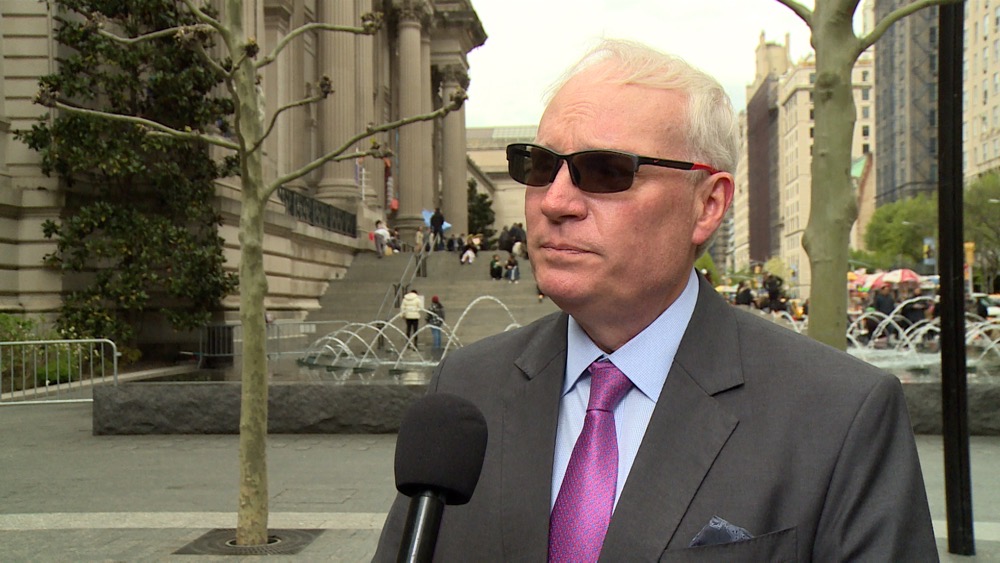
“We believe there’s essential progress that could be done now. There are 25 members of the Galaxy Leader crew, the ship that was taken by the Houthis on Nov. 19 last year, still being held.
“They’re from five different countries. There is no reason why these individuals, who are innocent seafarers, are being detained in Hodeidah by the Houthis. Let them go. Release the ship. There are steps that could be taken. We could continue working on prisoner releases.
“These kinds of things will demonstrate to the Yemeni people that there’s still hope and that the international community is still focused on their situation.”
Lenderking said it would be a “terrible tragedy” to squander the progress toward peace that had been made in the previous two years.
A truce negotiated in April 2022 between the parties in Yemen had initially led to a reduction in violence and a slight easing in the dire humanitarian situation in the country. Two years on, the UN has lamented there is now little to celebrate.
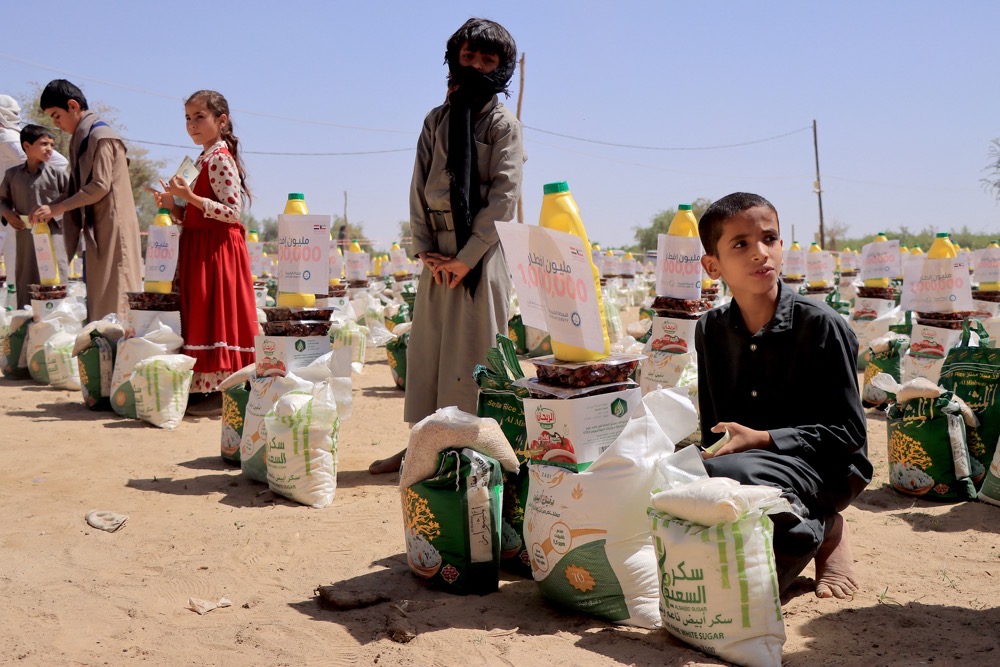
“Detainees we had hoped would be released in time to spend Eid with their loved ones remain in detention,” said UN envoy Grundberg. “Roads we had hoped to see open remain closed.
“We also witnessed the tragic killing and injury of 16 civilians, including women and children, when a residence was demolished by Ansar Allah (Houthi) individuals in Al-Bayda governorate.”
The humanitarian situation in Yemen has also become markedly worse in recent months amid rising food insecurity and the spread of cholera.
Edem Wosornu, director of operations and advocacy at the UN Office for the Coordination of Humanitarian Affairs, told the Security Council in the same briefing that the situation had deteriorated further after the World Food Programme suspended the distribution of food aid in areas controlled by the Houthis in December 2023.
This pause followed disagreements with local authorities over who should receive priority assistance and was compounded by the effects of a severe funding crisis on WFP humanitarian efforts in Yemen.
“The most vulnerable people — including women and girls, marginalized groups such as the Muhamasheen, internally displaced people, migrants, asylum seekers and refugees, and persons with disabilities — still depend on humanitarian assistance to survive,” said Wosornu.
Wosornu also voiced concern about an increase in cases of cholera in Yemen amid the deterioration of public services and institutions.
“The re-emergence of cholera, and growing levels of severe malnutrition, are telling indicators of the weakened capacity of social services,” she said.
“Almost one in every two children under five are stunted, more than double the global average: 49 percent compared to 21.3 percent.
“Emergency stocks of essential supplies are almost depleted. And water, sanitation and hygiene support systems need urgent strengthening.”
The humanitarian response plan for Yemen is only 10 percent funded, with funding for its food security and nutrition programs standing at just 5 percent and 3 percent respectively, according to an informal update presented to the Security Council by the OCHA this week.
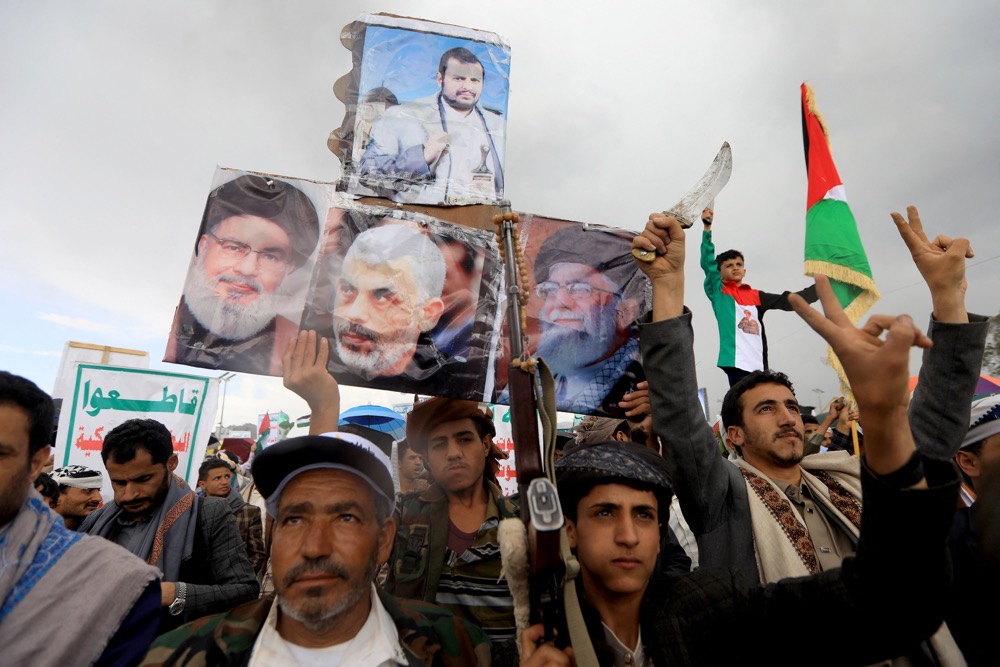
Wosornu appealed to the international community to take urgent action to help fill the funding gaps.
Commenting on the funding shortage, Lenderking said: “When there’s a genuine possibility of a Yemen peace process, donors will take note of that and respond. But the fact that we’re in this limbo, where the peace process is on hold while the Houthi is continuing these attacks (in the Red Sea), that I think is to be blamed on the Houthis because they’re derailing what was a legitimate peace process.
“But once we can get back to that, I think we could call on the international community to say, look, there is a ray of hope. There is a process. There is a commitment. The US is supporting an international effort. We can get the donors to come back to Yemen, despite all of the competition for these very scarce resources.”
